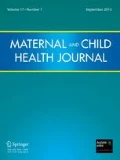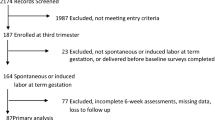Abstract
Using data from two postpartum depression randomized trials, we examined the association between postpartum depressive symptoms and parenting practices among a diverse group of mothers. We examined the association between safety practices (back sleep position, car seat use, smoke alarm), feeding practices (breastfeeding, infant intake of cereal, juice, water), and health care practices (routine well child and Emergency Room (ER) visits) with 3-month postpartum depressive symptoms assessed using the Edinburgh Depression Scale (EPDS ≥10). Fifty-one percent of mothers were black or Latina, 33 % had Medicaid, and 30 % were foreign born. Depressed mothers were less likely to have their infant use back sleep position (60 vs. 79 %, p < .001), always use a car seat (67 vs. 84 %, p < .001), more likely to feed their infants water, juice, or cereal (36 vs. 25 %, p = .04 respectively), and to bring their babies for ER visits (26 vs. 16 %, p = .03) as compared with non-depressed mothers. In multivariable model, depressed mothers remained less likely to have their infant use the back sleep position, to use a car seat, and to have a working smoke alarm in the home. Findings suggest the need to intervene early among mothers with depressive symptoms and reinforce positive parenting practices.
Similar content being viewed by others
References
McLearn, K. T., Minkovitz, C. S., Strobino, D. M., Marks, E., & Hou, W. (2006). Maternal depressive symptoms at 2 to 4 months post partum and early parenting practices. Archives of Pediatrics and Adolescent Medicine, 160(3), 279–284.
McLearn, K. T., Minkovitz, C. S., Strobino, D. M., Marks, E., & Hou, W. (2006). The timing of maternal depressive symptoms and mothers’ parenting practices with young children: Implications for pediatric practice. Pediatrics, 118(1), e174–e182.
Chung, E. K., McCollum, K. F., Elo, I. T., Lee, H. J., & Culhane, J. F. (2004). Maternal depressive symptoms and infant health practices among low-income women. Pediatrics, 113(6), e523–e529.
Paulson, J. F., Dauber, S., & Leiferman, J. A. (2006). Individual and combined effects of postpartum depression in mothers and fathers on parenting behavior. Pediatrics, 118(2), 659–668.
Field, T. (2010). Postpartum depression effects on early interactions, parenting, and safety practices: A review. Infant behavior & development, 33(1), 1–6.
Howell, E. A., Mora, P. A., Horowitz, C. R., & Leventhal, H. (2005). Racial and ethnic differences in factors associated with early postpartum depressive symptoms. Obstetrics and Gynecology, 105(6), 1442–1450.
Chung, E. K., Hung, Y. Y., Marchi, K., Chavez, G. F., & Braveman, P. (2003). Infant sleep position: Associated maternal and infant factors. Ambulatory Pediatrics, 3(5), 234–239.
McLennan, J. D., & Kotelchuck, M. (2000). Parental prevention practices for young children in the context of maternal depression. Pediatrics, 105(5), 1090–1095.
Minkovitz, C. S., Strobino, D., Scharfstein, D., et al. (2005). Maternal depressive symptoms and children’s receipt of health care in the first 3 years of life. Pediatrics, 115(2), 306–314.
Moehler, E., Brunner, R., Wiebel, A., Reck, C., & Resch, F. (2006). Maternal depressive symptoms in the postnatal period are associated with long-term impairment of mother-child bonding. Archives of women’s mental health, 9(5), 273–278.
Sohr-Preston, S. L., & Scaramella, L. V. (2006). Implications of timing of maternal depressive symptoms for early cognitive and language development. Clinical Child and Family Psychology Review, 9(1), 65–83.
Lovejoy, M. C., Graczyk, P. A., O’Hare, E., & Neuman, G. (2000). Maternal depression and parenting behavior: A meta-analytic review. Clinical Psychology Review, 20(5), 561–592.
Glascoe, F. P., & Leew, S. (2010). Parenting behaviors, perceptions, and psychosocial risk: Impacts on young children’s development. Pediatrics, 125(2), 313–319.
National Research Council and Institute of Medicine. (2009). Depression in parents, parenting, and children: Opportunities to improve identification, treatment, and prevention. Washington, DC: The National Academies Press.
Cox, J. L., Holden, J. M., & Sagovsky, R. (1987). Detection of postnatal depression. Development of the 10-item Edinburgh Postnatal Depression Scale. British Journal of Psychiatry, 150, 782–786.
American College of Obstetricians and Gynecologists Committee on Obstetric Practice. (2010). Committee opinion no 453: Screening for depression during and after pregnancy. Obstetrics and Gynecology, 115(2 Pt 1), 394–395.
Josefsson, A., Angelsioo, L., Berg, G., et al. (2002). Obstetric, somatic, and demographic risk factors for postpartum depressive symptoms. Obstetrics and Gynecology, 99(2), 223–228.
Martin, A., Negron, R., Balbierz, A., Bickell, N., & Howell, E. A. (2013). Recruitment of black and Latina women to a randomized controlled trial. Journal of Health Care for the Poor and Underserved, 24(3), 1102–1114.
Howell, E. A., Balbierz, A., Wang, J., Parides, M., Zlotnick, C., Leventhal, H. (2012). Reducing postpartum depressive symptoms among black and Latina mothers: A randomized controlled trial. Obstetrics and gynecology, 119(5), 942–949.
Howell, E. A., Bodnar-Deren, S., Balbierz, A. et al. (2013). An intervention to reduce postpartum depressive symptoms: A randomized controlled trial. Archives of women’s mental health, 17(1), 57–63.
Howell, E. A., Bodnar-Deren, S., Balbierz, A., Parides, M., Bickell, N. (2013). An intervention to extend breastfeeding among black and Latina mothers after delivery. American Journal of Obstetrics and Gynecology, 210(3), 239.e1–239.e5.
Task Force on Sudden Infant Death Syndrome, Moon, R. Y. (2011). SIDS and other sleep-related infant deaths: Expansion of recommendations for a safe infant sleeping environment. Pediatrics, 128(5), 1030–1039.
Durbin, D. R. (2011). Child passenger safety. Pediatrics, 127(4), 788–793.
Committee on Injury and Poison Prevention. (2000). Reducing the number of deaths and injuries from residential fires. Pediatrics, 105(6), 1355–1357.
(1997). Breastfeeding and the use of human milk. American Academy of Pediatrics. Work Group on Breastfeeding. Pediatrics, 100(6), 1035–1039.
U.S. Department of Health and Human Services. Office of Disease Prevention and Health Promotion. Healthy People 2020. http://www.healthypeople.gov/2020/topics-objectives/topic/maternal-infant-and-child-health/objectives. Accessed 5 Dec 2011.
Centers for Disease Control and Prevention (CDC). (1999). Progress in reducing risky infant sleeping positions–13 states, 1996–1997. MMWR Morb Mortal Wkly Rep, 48(39), 878–882.
Pediatrics TAAo. Recommendations for Preventive Pediatric Health Care. 2008; http://brightfutures.aap.org/pdfs/Guidelines_PDF/20-Appendices_PeriodicitySchedule.pdf.
Bennett, I. M., Coco, A., Coyne, J. C., et al. (2008). Efficiency of a two-item pre-screen to reduce the burden of depression screening in pregnancy and postpartum: An IMPLICIT network study. The Journal of the American Board of Family Medicine, 21(4), 317–325.
Boyd, R. C., Le, H. N., & Somberg, R. (2005). Review of screening instruments for postpartum depression. Archives of women’s mental health, 8(3), 141–153.
Hanusa, B. H., Scholle, S. H., Haskett, R. F., Spadaro, K., & Wisner, K. L. (2008). Screening for depression in the postpartum period: a comparison of three instruments. Journal of Women’s Health (Larchmt), 17(4), 585–596.
New York State Department of Motor Vehicles. http://www.dmv.ny.gov/broch/c-1.htm. Accessed 16 May 2013.
Stone, K. E., Eastman, E. M., Gielen, A. C., et al. (2007). Home safety in inner cities: Prevalence and feasibility of home safety-product use in inner-city housing. Pediatrics, 120(2), e346–e353.
Martin, J. A., Hamilton, B. E., Sutton, P. D., et al. (2007). Births: Final data for 2005. National Vital Statistics Reports, 56(6), 1–103.
Martin, J. A., Hamilton, B. E., Sutton, P. D., Ventura, S. J., Menacker, F., & Kirmeyer, S. (2006). Births: final data for 2004. National Vital Statistics Reports, 55(1), 1–101.
Postpartum Support International, U.S. State Legislation. 2010; http://www.postpartum.net/News-and-Events/Legislation.aspx. Accessed 5 July 2014.
Olson, A. L., Dietrich, A. J., Prazar, G., et al. (2005). Two approaches to maternal depression screening during well child visits. Journal of Developmental and Behavioral Pediatrics, 26(3), 169–176.
Olson, A. L., Dietrich, A. J., Prazar, G., & Hurley, J. (2006). Brief maternal depression screening at well-child visits. Pediatrics, 118(1), 207–216.
Acknowledgments
This study was supported by the National Institute on Minority Health and Health Disparities grant 5P60MD000270 (Trial Registry Number ID: NCT01312883) and the National Institute of Mental Health grant 5R01MH77683 (Trial Registry Number ID: NCT00951717).
Author information
Authors and Affiliations
Corresponding author
Rights and permissions
About this article
Cite this article
Balbierz, A., Bodnar-Deren, S., Wang, J.J. et al. Maternal Depressive Symptoms and Parenting Practices 3-Months Postpartum. Matern Child Health J 19, 1212–1219 (2015). https://doi.org/10.1007/s10995-014-1625-6
Published:
Issue Date:
DOI: https://doi.org/10.1007/s10995-014-1625-6




